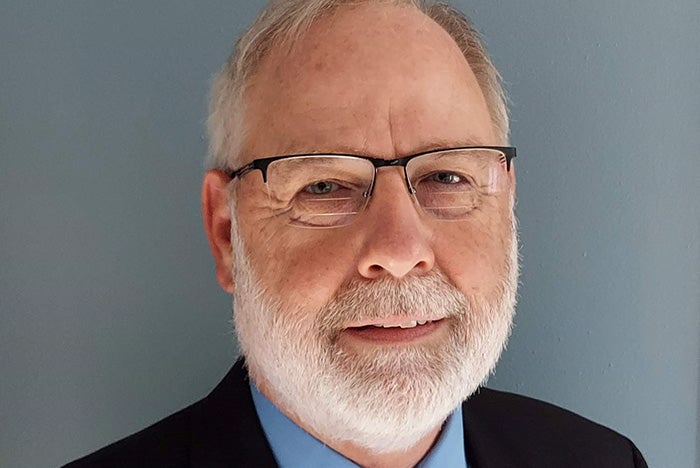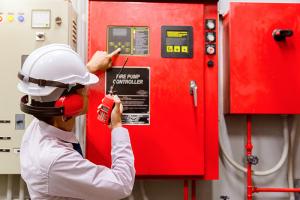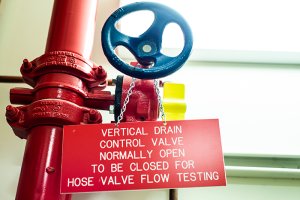ASHE President’s Award recipient touts teamwork

The Pufahl File
CV
- Director of enterprise facility service (retired), Froedtert Health, Froedtert West Bend Hospital, West Bend, Wis.
- Director of facility management, SynergyHealth — St. Joseph’s Hospital, West Bend.
- Director of plant operations, Wheaton Franciscan Healthcare — Elmbrook Memorial Hospital, Brookfield, Wis.
- Manager of plant operations, Wheaton Franciscan Healthcare — Elmbrook Memorial Hospital.
- Maintenance supervisor, Wheaton Franciscan Healthcare — Elmbrook Memorial Hospital.
- Maintenance mechanic/stationary engineer, Wheaton Franciscan Healthcare — Elmbrook Memorial Hospital.
Affiliations
- American Society for Health Care Engineering (ASHE) member.
- ASHE Advisory Board president (2019).
- Wisconsin Healthcare Engineers Association (WHEA) president (2012).
- WHEA Foundation board member.
- YMCA Construction Advisory Committee Volunteer of the Year (2021).
- National Fire Protection Association member.
Education
- Certificate, electronic service from Waukesha County Technical College, Pewaukee, Wis.
- Certificate, machine repair from Moraine Park Technical College, West Bend.
Dean M. Pufahl, CHFM, CHC, past president of the American Society for Health Care Engineering (ASHE) Advisory Board, was presented the 2023 ASHE President’s Award during August’s ASHE Annual Conference. In this month’s HFM interview, Pufahl reflects on his personal philosophy and the impact of his involvement.
How does it feel to receive this year’s President’s Award?
It is humbling that I am being recognized for what I would call team success, and yet it is very rewarding to be acknowledged by peers for my ideas and efforts. I am very grateful for the people who have supported me over the years, for those who have trusted me enough to let me run with my crazy ideas, those who challenged me to be better and for those who blazed the trail that made it possible for me to be successful.
What philosophies do you hold that have helped you succeed in your work?
Volunteer every chance you get. You gain valuable experience, expand your knowledge and strengthen your peer network. That, and get up every morning with the intent to improve one thing, fix one process, remove one barrier or make someone’s job easier. Just one thing — that’s all it takes. It doesn’t need to be a transformational change; most often it’s a simple transitional change or process improvement that will make the biggest difference. If you do this, in a week you will see the change in your job; at the end of a month, your team will feel the impact; in a few months, your peers and leaders will have noticed the improvements; and at the end of a year, you will have had a positive impact on your organization that everyone will have noticed.
Was there a turning point in your career that affirmed your confidence in your abilities as a health facilities leader?
In 2006, I was recruited by a small hospital system in my hometown, and it gave me an opportunity to find out whether my prior success was due to my efforts or if I was just part of a great team. It turned out to be both. I learned that my programs worked; I also learned that in the expanded role directing several services departments, I needed additional skills to continue being successful.
Looking for experts in the areas where I lacked knowledge had me reaching out to other ASHE and Wisconsin Healthcare Engineering Association (WHEA) members, who openly shared their experiences and pointed me to the best education programs.
This left me with a far deeper appreciation for ASHE and WHEA education programs and the benefits of networking, which are such an important part of both the ASHE and WHEA experience. This was also the period where I became aware of the need to give back.
How did you get your start with ASHE?
There was a series of events that led to my involvement and commitment to ASHE. I had attended the ASHE Annual Conference & Technical Exhibition for a few years at that point, and several of those times were on my own dime. I have always felt that the Annual Conference provided value that I could not get elsewhere, and it was worth the investment.
While traveling to the Annual Conference one year, I met Steve Vinopal, WHEA member and ASHE Advisory Board Region 6 Representative. Steve pulled me into the ASHE Region 6 Conference Committee, where I learned about the need for quality education at a regional level and the value that education brought to ASHE members who were unable to attend the ASHE Annual.
A few years later, I joined the WHEA Board. Wade Rudolph, then president of WHEA, nominated me for the ASHE Region 6 Emerging Leader Award, which I did receive. As my region’s emerging leader, I was invited to the ASHE Leadership Institute, which was an amazing experience and opened new doors and opportunities to participate on ASHE committees and task forces. Also, networking with the other emerging leaders, members and ASHE staff has led to many new opportunities to get involved.
What value did ASHE provide for you at that phase of your professional life?
In the early part of my career, much of my education and facility operations knowledge came from reading ASHE articles and white papers. These became the foundation of my job knowledge, and as my role in the facilities department progressed from maintenance mechanic/stationary engineer to supervisor, manager, director and then director over multiple departments, the articles I read supported that growth. ASHE as an organization has a wealth of information available to the membership. No matter where you are in your career, ASHE has resources in multiple formats that can help you grow your job knowledge and skills.
I also have to recognize the value of attending the ASHE Annual Conference. The networking aspect of the conference is invaluable for career development, but for me, the real benefit is learning from experts in the field and health care facilities leaders. As a maintenance mechanic, I had a sign in my toolbox that read, “A good mechanic has the right tool for every job.” I found out in my career that ASHE is the “right tool.”
Which issues facing the ASHE membership were most important to you during your time as president?
The timing here is key, as my term as president was ending as the COVID-19 pandemic started, which changed everyone’s focus in the months following. Prior to the pandemic, I would say that “change” was the issue. There was no one specific issue when it came to challenges the ASHE Advisory Board faced during my term as president, as everything was changing rapidly.
Technology advancements changed how people learned and wanted to learn; there were urgent conversations happening around diversity; member expectations exceeded our capacity to meet the speed of change; the American Hospital Association changed how it viewed and managed its professional membership groups (including ASHE); budgets were in flux; and long-term ASHE staff turned over. For each of these issues, there was pressure pushing for the change and also pushing back against that change.
Navigating these pressures offered unique challenges for the ASHE Advisory Board, but by tapping into our most valuable resource — our members’ knowledge and experience — through open communication with board members, we were able to make impactful positive changes.
Which accomplishments in your career or with ASHE are you most proud of?
For me, the pride comes in two areas: seeing the success of the people I have worked with or helped along in their careers, and seeing the processes and programs I have been able to put in place to help the next person. If I had to pick two examples, they would be the Women’s Networking and Mentoring initiatives and the work with the Region 6 Educational Conference Committee.
Again, these were great successes not because of my work alone, but because many other people took these ideas and brought them to fruition. Kudos to all the ASHE members, chapter leaders and business partners who worked together to help these programs succeed!
Landon Hegedus is assistant editor of Health Facilities Management magazine.




